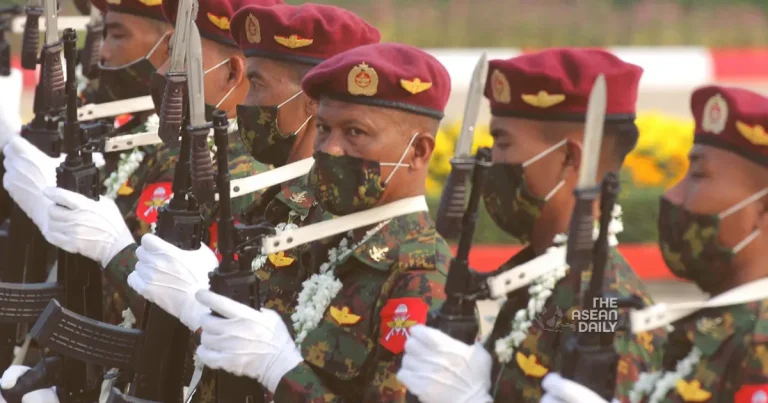27-3-2024 (YANGON) As Myanmar observes Armed Forces Day on Wednesday (Mar 27), the nation faces a multitude of obstacles ranging from rebel drone strikes to the imperative to modernize weaponry and bolster troop numbers.
This occurs against the backdrop of the military’s forthcoming recruitment of civilians next month, following the recent activation of a dormant enlistment law. Traditionally, on Armed Forces Day, Myanmar showcases its modern weaponry and tactical prowess, underscoring its capacity to counter external threats.
However, the nation contends with persistent internal strife.
Since the 2021 coup, the military has been accused of turning its firepower against civilians, conducting airstrikes and incinerating villages. Consequently, Armed Forces Day has become synonymous with heightened violence, according to observers.
In 2021, violence peaked on Armed Forces Day, nearly two months post-coup, with approximately 100 casualties reported nationwide. The Myanmar military clashed with an ethnic armed group, prompting civilians to flee into neighbouring Thailand.
The following year, Myanmar’s junta chief, Min Aung Hlaing, pledged to “annihilate” terrorist groups. During last year’s Armed Forces Day, he reiterated this resolve to confront adversaries.
Myanmar’s military strategy has long focused on enhancing its capabilities, including procuring advanced weaponry and bolstering troop numbers. However, these efforts faced setbacks post-coup.
The army’s total strength, estimated at 200,000 to 300,000, faces depletion due to battlefield casualties and defections.
Three years after the coup, army chief Min Aung Hlaing hinted at conscription, which materialized earlier this year.
On Feb 10, the Myanmar army announced plans for mandatory conscription starting mid-April, emphasizing the need for citizens to safeguard national independence. Men aged 18 to 35 and women aged 18 to 27 will face compulsory military service of up to two years. Certain professions, such as doctors and engineers, may entail extended service up to five years during a state of emergency, prevailing since the coup.
This move has prompted young and middle-aged individuals to seek ways to leave the country. Security expert Min Zaw Oo suggests that the military may intensify measures to prevent departures, including enhanced airport screenings and ticket purchase restrictions.
Amid efforts to tighten control, army chief Min Aung Hlaing faces mounting pressure from supporters to resign. His leadership has been questioned following a series of defeats against rebel groups in a recent offensive, dubbed Operation 1027.
Despite expectations for upheaval, observers foresee no immediate change. Rebel deployment of modified drones poses a fresh challenge to the military’s efficacy. These drones, initially intended for recreational use, have been adapted to carry explosives, altering the nature of warfare and military doctrine.




